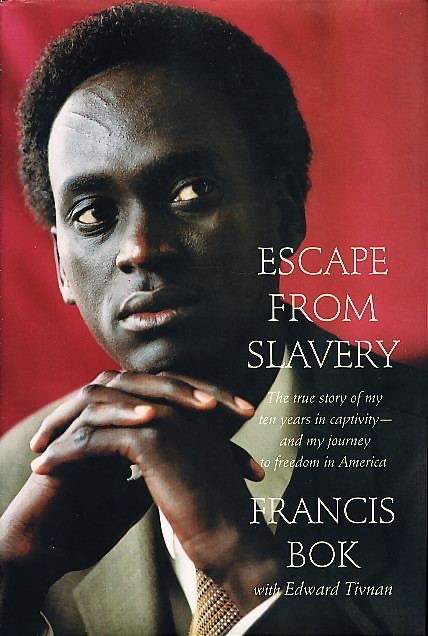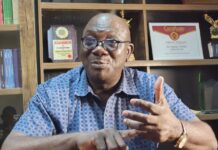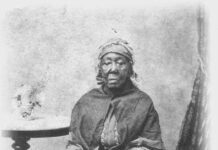Francis Bol Bok: A story of resilience and influence in modern slavery, by Gift Luckson
Francis Piol Bol Bok (born February 1979) is a Dinka tribesman and citizen of South Sudan who was a slave for ten years before becoming an abolitionist and author in the United States.
Origin
Francis Bok was raised in a large Catholic family of cattle herders in the Dinka village of Gurion in Southern Sudan. His father, Bol Buk Dol, managed several herds of cattle, sheep and goats. When Bok was captured at the age of 7 on May 15, 1986, he could not count beyond 10 and knew very little of the outside world.
Capture
Bok was captured after his mother, Adut Al Akok, had sent him to the village of Nyamlell to sell eggs and peanuts in the village market with some older siblings and neighbours. This was Bok’s first trip to the village without his mother, and it was the first time he was allowed to sell some of the family’s goods at the market.
While at the market, Bok heard adults say that they had seen smoke coming from nearby villages and had heard gunfire in the distance.
People began fleeing the market as Francis saw horsemen with machine guns. The gunmen surrounded the market and shot the men in Nyamlell.
The raiders were part of an Islamic militia from the northern part of Sudan that conducted periodic raids on the villages of their Dinka neighbours, who were Christians or animists of Sub-Saharan African descent.
Enslavement and Escape
While living as a slave, Bok tried to escape in 1996. As a slave, he tended to the herds of Giemma, who regularly praised Bok’s work with the animals, yet still forced him to live a life of slavery.
Bok finally escaped from Giemma when he was 17 years old by walking through the forest to the nearby market town of Mutari. Bok went to the local police department to seek help and asked the police to assist him in finding his people. Instead of helping him, the police made him their slave for two months.
Bok escaped from the police by simply taking their donkeys to the well, tying them, and leaving them behind as he walked into the crowded marketplace.
Bok asked a man with a truck to give him a ride out of Mutari. The man, a Muslim named Abdah, agreed to help him. Abdah thought that slavery was wrong and agreed to transport Bok to the town of Ed-Da’Ein in the back of his truck amongst his cargo of grain and onions.
READ ALSO: From Streets to Screens: Social media and the rise of prostitution in Nigeria, by Gift Luckson
Bok stayed with Abdah, his wife and two sons for two months while Abdah tried to find a way to take Bok to Khartoum, the capital city of Sudan.
When he could not find a friend to provide passage to Khartoum, Abdah bought a bus ticket to Khartoum for Bok.
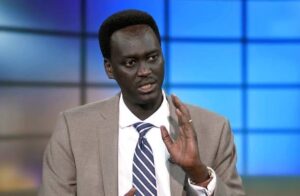
Freedom
Bok arrived in Khartoum with no money and no place to go. A stranger eventually helped him find his way to his fellow Dinka tribespeople in Khartoum in the Jabarona settlement.
Bok lived in bondage for ten years before escaping imprisonment in Kurdufan, Sudan, followed by a journey to the United States by way of Cairo, Egypt.
Trip to the United States
Bok was aided by a fellow Dinka tribesman and members of the Fur people, and his trip to the United States was paid for by members of the Evangelical Lutheran Church in America.
His first point of contact in the United States was a refugee from Somalia who helped him get settled in Fargo, North Dakota.
Bok worked several jobs, including making pallets and plastic knobs for car gearshifts. He heard of a large population of Dinka in Ames, Iowa, and moved to Ames after several months in Fargo. It was while living in Ames that he was contacted by Charles Jacobs, founder of the American Anti-Slavery Group (AASG) based in Boston, Massachusetts.
Bok has testified before the United States Senate and met with George W. Bush, Madeleine Albright and Condoleezza Rice, telling them his story of slavery.
He has been honoured by the United States Olympic Committee, the Boston Celtics and colleges and universities throughout the United States and Canada.
READ ALSO: Internet as new gateway for human trafficking, by Gift Luckson
Influence and the Abolitionist Movement
Bok’s autobiography, Escape from Slavery: The True Story of My Ten Years in Captivity and My Journey to Freedom in America, published by St. Martin’s Press, chronicles his life, from his early youth, his years in captivity, to his work in the United States as an abolitionist.
Jesse Sage, associate director of the American Anti-Slavery Group, and Jacobs persuaded Bok to move to Boston to work with the AASG. He was initially hesitant to leave his new friends in Ames, but according to Bok, the people at AASG were persistent. He arrived in Boston on May 14, 2000, AASG helped him find an apartment. A week after moving to Boston, he was invited to speak at a Baptist church in Roxbury and was interviewed by Charles A. Radin of The Boston Globe.
Two days after his speech in Roxbury, Bok was asked to meet with supporters of AASG on the steps of the United States Capitol in Washington, D.C.
He returned to Washington on September 28, 2000, and became the first escaped slave to speak before the United States Senate Committee on Foreign Relations. Bok was invited to Washington again in 2002 for the signing of the Sudan Peace Act and met with President George W. Bush. It was during this trip to the White House that Bok became the first former slave to meet with a U.S. President since the 19th century.
Bok has spoken at churches and universities throughout the United States and Canada and he has helped launch the American Anti-Slavery Group’s website iAbolish.org at a Jane’s Addiction concert before an audience of 40,000 on April 28, 2001.
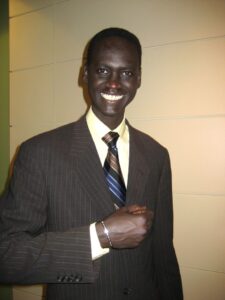
Perry Farrell was a key early supporter of the “I” Abolish movement.
Bok currently lives with his wife, Atak, and their two young children, Buk and Dhai, in Kansas.
He is now working in the AASG’s first extension office in Kansas. He also works with Sudan Sunrise, a Lenexa, Kansas-based organisation that seeks to work for peace and unity in Sudan.
Follow the Neptune Prime channel on WhatsApp:
Do you have breaking news, interview request, opinion, suggestion, or want your event covered? Email us at neptuneprime2233@gmail.com

